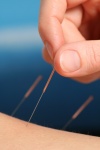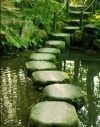Manage Your Reproductive Health with Acupuncture
 | |
Statistics state that one in five couples over the age of 30 have difficulty conceiving after one year of trying. Many of these couples are turning to acupuncture and Oriental medicine for a safe, effective and natural solution to have a healthy baby.
Fertility treatments were first recorded by Zhang Zhong Jing, a famous physician from the Han Dynasty, in his discussion of diseases in women in the Jin Gui Yao Lue or Essentials of the Golden Cabinet.
According to the principles of Oriental medicine, a person's health is determined by the quality of Qi, the vital life energy, and blood circulating through the body. When Qi and blood are circulating properly, the body is properly nourished and functioning optimally which, in turn, enhances fertility.
Researchers have confirmed the benefits of acupuncture and Oriental medicine for:
- * regulating the menstrual cycle
* improving sperm count and motility
* reducing stress and anxiety associated with infertility
* normalizing hormone and endocrine systems
* improving blood flow in the uterus
* decreasing the chance of miscarriage
* increasing the chance of pregnancy for women undergoing in vitro fertilization (IVF)
Fertility treatment approaches can vary from person to person, but are usually scheduled for at least three consecutive cycles (twelve weeks). Treatments can include acupuncture, customized herbal therapy, stress reduction and dietary counseling.
If you or someone you know is experiencing difficulties with their reproductive health please call to see how acupuncture and Oriental medicine can help.
Premenstrual Syndrome (PMS)
Gynecological conditions including premenstrual
syndrome (PMS), fibroids, endometriosis, menopause and infertility are some of
the problems treated most successfully by acupuncture and Oriental medicine.
Oriental medicine has long recognized that health and vitality can be sustained
over a woman's lifetime by restoring balance within the body and supporting the
natural production of essential hormones.
Premenstrual Syndrome (PMS)
Premenstrual syndrome covers a broad spectrum that can include emotional symptoms such as depression, irritability, sadness, anxiety, or poor concentration and can also include physical symptoms, such as breast tenderness, a change in bowel habits, acne, or loss of libido. Symptoms can change from month to month and vary widely in terms of severity. Imbalances can arise from a variety of factors, including poor diet, too much work, physical or emotional trauma, constitutionally weak Qi (energy) or stress.
In Oriental medicine, the liver is considered responsible for the smooth flow of Qi (life force) throughout the body and for smoothing our emotions. When the liver's function of moving Qi is disrupted, Qi can become stuck. This is referred to as Liver Qi Stagnation and is commonly associated with PMS. In addition to irritability and moodiness, signs and symptoms may include: distending pain in the area below the ribs, stuffiness of the chest, sighing, abdominal distention, nausea, sour regurgitation, belching, diarrhea or constipation, feeling of a lump in the throat, irregular periods, painful periods and distention of the breasts prior to periods.
If you or someone you know is struggling with symptoms associated with premenstrual syndrome call today to see how acupuncture can help!
Premenstrual Syndrome (PMS)
Premenstrual syndrome covers a broad spectrum that can include emotional symptoms such as depression, irritability, sadness, anxiety, or poor concentration and can also include physical symptoms, such as breast tenderness, a change in bowel habits, acne, or loss of libido. Symptoms can change from month to month and vary widely in terms of severity. Imbalances can arise from a variety of factors, including poor diet, too much work, physical or emotional trauma, constitutionally weak Qi (energy) or stress.
In Oriental medicine, the liver is considered responsible for the smooth flow of Qi (life force) throughout the body and for smoothing our emotions. When the liver's function of moving Qi is disrupted, Qi can become stuck. This is referred to as Liver Qi Stagnation and is commonly associated with PMS. In addition to irritability and moodiness, signs and symptoms may include: distending pain in the area below the ribs, stuffiness of the chest, sighing, abdominal distention, nausea, sour regurgitation, belching, diarrhea or constipation, feeling of a lump in the throat, irregular periods, painful periods and distention of the breasts prior to periods.
If you or someone you know is struggling with symptoms associated with premenstrual syndrome call today to see how acupuncture can help!
Pregnancy & Childbirth
Pregnancy is an amazing time in a woman's life. Many
women report feeling healthier than they have ever felt before; however, the
physical growth of the baby and changes in hormone levels can bring about pain,
discomfort and a variety of health problems.
Acupuncture and Oriental medicine can provide a safe, effective alternative for many of the health complications that may arise before, during and after pregnancy. A growing number of women are choosing acupuncture to manage their health throughout their pregnancy and as an optional treatment for an overdue or difficult labor.
Planning for a Healthy Baby
Healthy parents produce healthy babies. With acupuncture and Oriental medicine, parents can improve their health to create the most optimal environment for their unborn child. In addition to their ability to strengthen, support, and balance overall health and well-being, acupuncture and Oriental medicine are effective treatments for regulating menstruation and hormone levels, reducing stress and addressing any pre-existing medical conditions or concerns.
Acupuncture during Pregnancy
Acupuncture and Oriental medicine can play a vital role in the comfort of a pregnant woman. There is strong evidence to support the belief that acupuncture is highly effective in treating some of the most common problems experienced during pregnancy.
Some of the problems that an acupuncturist often treats during pregnancy include:
Acupuncture and Oriental medicine can provide a safe, effective alternative for many of the health complications that may arise before, during and after pregnancy. A growing number of women are choosing acupuncture to manage their health throughout their pregnancy and as an optional treatment for an overdue or difficult labor.
Planning for a Healthy Baby
Healthy parents produce healthy babies. With acupuncture and Oriental medicine, parents can improve their health to create the most optimal environment for their unborn child. In addition to their ability to strengthen, support, and balance overall health and well-being, acupuncture and Oriental medicine are effective treatments for regulating menstruation and hormone levels, reducing stress and addressing any pre-existing medical conditions or concerns.
Acupuncture during Pregnancy
Acupuncture and Oriental medicine can play a vital role in the comfort of a pregnant woman. There is strong evidence to support the belief that acupuncture is highly effective in treating some of the most common problems experienced during pregnancy.
Some of the problems that an acupuncturist often treats during pregnancy include:
- * nausea, vomiting and morning sickness
* heartburn
* constipation
* edema and swelling
* pelvic pain
* neck and back pain
* sciatica
* leg cramps
* fatigue and exhaustion
* insomnia
* anxiety and depression
* water retention
Acupuncture for Childbirth
While there are acupuncture points that can provide natural pain relief during labor, acupuncture is more commonly used to induce labor. There are several points that stimulate contractions and influence cervical ripening. There is also an acupuncture point that has been found to turn a breech baby.
Postpartum Recovery
Many women feel depleted after the birth experience.
Acupuncture and Oriental medicine can help smooth the transition during those
first few months after birth to ensure a quick recovery.
Some postpartum disorders that can be treated with acupuncture:
Some postpartum disorders that can be treated with acupuncture:
- * fatigue
* postpartum depression
* mastitis
* insufficient or excessive lactation
* post-operative healing
* night sweats
Postpartum care focuses on the physical, emotional and psychological recovery of the mother from the effects of pregnancy and labor, as well as encouraging breast feeding.
If you would like learn how acupuncture and Oriental medicine can facilitate your postpartum recovery, please call for more information.
LIFESTYLE CHANGES
Make lifestyle changes.Make the decision to finally take care of that pain you've been having for too long now, or that digestive problem. Stress been around too long??? Take care of it now because it's not a matter of IF it is going to affect your health, it is a matter of WHEN it will.
Don't want Botox or surgery on your face?? Consider the micro-current light-therapy sessions I offer. You can have a free demonstration, just call my office and schedule a 15 minute demo.
http://www.marleneklein.blogspot.com
"If we don't take good care of our body, where will we live? Anonymous








